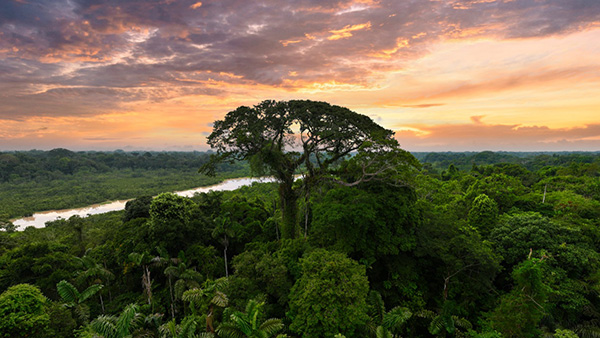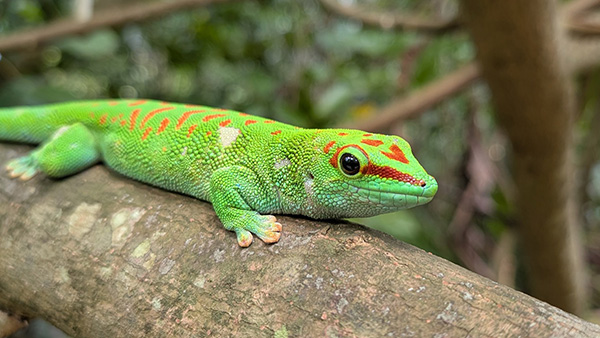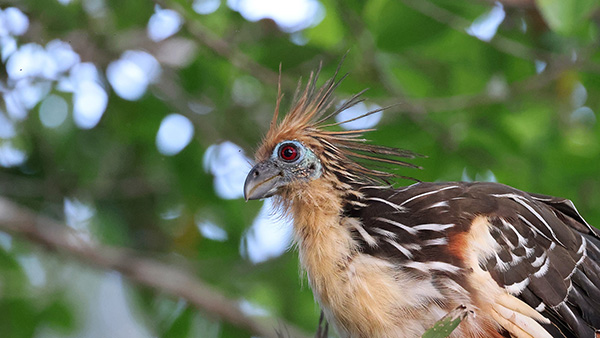WORLD RAINFOREST
By Rhett A. Butler Last updated Aug 14, 2020
The Tropical Rainforest - information on tropical forests, deforestation, and biodiversity
Sections:
The Latest News on Rainforests
The case for hope in environmental journalism (Aug 11 2025)
I often return to this image, which I took in 2022 in Jambi, Indonesia. At first glance, it seems to capture something hopeful: a full-circle rainbow arcing over a lush green landscape. But look closer, and you’ll see what lies beneath the beauty: a vast oil palm plantation, carved out of what was once native […]
Indigenous alliance unveils Brazil’s first Native-led emissions strategy (Aug 9 2025)
Brazil’s largest Indigenous organization has launched the country’s first Native-led strategy to cut greenhouse gas emissions, ahead of International Day of the World’s Indigenous Peoples on Aug. 9. The idea is for the plan to be incorporated into the Brazilian government’s own emissions reduction plan, the Nationally Determined Contribution (NDC), which the country updates and […]
Who is clearing Indonesia’s forests — and why? (Aug 8 2025)
- Most tropical countries are experiencing record-high deforestation rates, but in Indonesia, forest loss is slowing.
- But nearly half of the forest cleared in 2024 can’t be linked to an identifiable driver, raising red flags about speculative land clearing, regulatory blind spots and delayed environmental harm.
- Land is often cleared but not immediately used; research shows that nearly half of deforested lands in Indonesia remain idle for more than five years.
- Experts say these trends signal regulatory failure, as the government issues permits widely and concession holders face few consequences for clearing forest and abandoning the land, creating a cycle of destruction without accountability.
Formalizing small-scale gold mining can reduce environmental impacts & crime (commentary) (Aug 7 2025)
- Small-scale gold mining provides more jobs than any other mining sector, yet it’s also the world’s largest source of mercury pollution, a major driver of tropical deforestation, and its informal nature breeds organized crime and corruption.
- One proposed solution to these ills is investment in centralized gold processing plants — which are already operating in nations like Peru and Tanzania — because they use less toxic techniques to extract the ore, while reducing the prevalence of criminal networks in the industry.
- The next international climate summit, COP30, which will be hosted in Brazil’s Amazon, offers a strategic opportunity to put the gold mining issue squarely on the international agenda, a new op-ed argues: “Gold’s glitter will not fade, but if mined without reform, it will continue costing the world its forests, its rivers, and its security.”
- This article is a commentary. The views expressed are those of the author, not necessarily of Mongabay.
How urban greening is helping Singapore bounce back from widespread forest loss (Aug 7 2025)
Singapore, the smallest country in Southeast Asia, lost most of its original forest cover in the early 1800s to agriculture. But since the 1960s, when Singapore began pursuing urban greening initiatives, Singapore has greened 47% of its spaces, according to an episode of Mongabay’s podcast published in July. Speaking with host Mike DiGirolamo, Anuj Jain, […]
Lúcio Flávio Pinto: The Brazilian reporter who wouldn’t be bought or silenced (Aug 6 2025)
- For nearly six decades, Lúcio Flávio Pinto has reported fearlessly from the Brazilian Amazon, chronicling land grabs, illegal logging, and environmental destruction while refusing to be silenced or swayed by power or money.
- After leaving Pará’s dominant newspaper in 1987, he launched Jornal Pessoal, a fiercely independent, ad-free newsletter funded solely by subscriptions, modeled after I.F. Stone’s Weekly.
- Pinto has faced physical assaults, death threats, 33 lawsuits, and judicial harassment—including a criminal conviction—yet has remained rooted in Belém, documenting the Amazon’s unraveling when others fled or fell silent.
- Now in his seventies, Pinto’s memoir Como me tornei um amazônida reflects a life devoted not to advocacy, but to truth as a form of reverence—undaunted by the odds, still trying to write a different ending for the forest he loves.
Invasion intensifies on Karipuna Indigenous land in the Brazilian Amazon (Aug 6 2025)
Illegal invasions in the Karipuna Indigenous Territory in the northwest of the Brazilian Amazon have started to advance again, Karipuna leaders told Mongabay following an alert by global nonprofit Survival International. “This year has been very difficult because there are a lot of people on our territory,” André Karipuna, the chief of the Karipuna people, […]
Cocoa boom fuels new wave of deforestation in Cameroon (Aug 4 2025)
Once threatened by palm oil and loggers, Cameroon’s forests now face a new driver of deforestation: booming cacao production to supply the European market. A new report by the environmental advocacy group Mighty Earth finds deforestation in Cameroon has accelerated, with the country losing around 782,000 hectares (1.9 million acres), or 4.2% of its forest […]
Indonesian farmers plant hope for isolated Javan gibbons (Aug 1 2025)
In Indonesia’s Central Java province, two groups of Javan gibbons have become isolated in two small forest patches. To help the gibbons make their way to larger forest areas, a local NGO, SwaraOwa, is working with farmers in the region to restore and build “corridors” that would connect the fragmented forest blocks, Mongabay reported in […]
Uncovering forest loss in gorilla park six months after M23 offensive in the DRC (Jul 31 2025)
- Six months since M23 armed rebels took control of provincial capitals in the eastern Democratic Republic of Congo, local activists and satellite imagery collected by Mongabay have identified sites of expanding forest loss in Kahuzi-Biega National Park.
- Researchers say this is due to collapsing conservation efforts, lack of park monitoring, and massive logging and charcoal production inside the national park. While M23 and other militias don’t produce the charcoal directly, they profit by taxing its transport and trade.
- Activists who have denounced the illegal exploitation have been harassed, attacked, or even killed. Some, like Josue Aruna, have been forced into hiding or exile after facing death threats.
- On July 19, the DRC government and M23 signed a ceasefire agreement, with conservationists saying they hope this will create conditions for restoring security in the area and halt the destruction of the rainforest.
Indigenous leadership and science revive Panama’s degraded lands (Jul 31 2025)
Two Indigenous groups in Panama are collaborating with researchers in a long-term reforestation project that promises them income in return for growing native trees for carbon sequestration, Mongabay contributor Marlowe Starling reported in May. As part of the project, researchers from the Smithsonian Tropical Research Institute (STRI) have partnered with the local leadership in the […]
Arboreal camera traps reveal wildlife feasting on Borneo’s fruiting fig trees (Jul 31 2025)
Camera traps installed high in the rainforest canopy in Malaysian Borneo have filmed a bounty of threatened primates, hornbills and a host of tree-dwelling animals feasting on figs. Biologists from Malaysia-based nonprofit 1StopBorneo Wildlife, along with Sabah Parks and local conservationists, scaled two enormous fig trees in Tawau Hills National Park in Sabah state to […]
As Indonesia reclaims forests from palm oil, smallholders bear brunt of enforcement (Jul 30 2025)
- Indonesian authorities have reclaimed 2 million hectares (5 million acres) of forest from illegal oil palm plantations under a militarized crackdown, but critics say it disproportionately targets Indigenous communities and smallholders while sparing large corporations, deepening land inequality.
- Much of the reclaimed land is being handed over to state-owned plantation company PT Agrinas Palma Nusantara, raising concerns that private monopolies are being replaced by a state one, with some communities pushed into profit-sharing schemes critics call exploitative.
- In biodiversity-rich Tesso Nilo National Park, thousands of families are being forcibly evicted, while powerful figures like a local legislator evade sanctions, highlighting a two-tiered policing system.
- Activists are calling for a new forestry law to address outdated legislation, protect Indigenous land rights, mandate ecological restoration, and close legal loopholes that allow corporate violators to avoid accountability.
Peruvian rainforest defender shot dead in suspected targeted killing (Jul 29 2025)
Environmental activist Hipólito Quispe Huamán was shot and killed Saturday night in the Madre de Dios region of southeastern Peru, in what authorities suspect was a targeted attack linked to his work defending the Amazon rainforest, AFP reports. Quispe Huamán was driving along the Interoceanic Highway when he was gunned down, according to local prosecutors. […]
‘Insignificant risk’ EUDR proposal threatens fight against deforestation, critics say (Jul 24 2025)
- Some European Union officials want to simplify a section of the EU Deforestation Regulation (EUDR), the bloc’s landmark law that seeks to eliminate commodities associated with deforestation.
- A European Parliament proposal wants to reconsider a benchmarking system that categorizes trading partners into high, standard and low deforestation risk.
- Supporters of the proposal say EUDR rules are still too complicated for producers, while environmental groups say the world’s forests can’t afford further delays.
Where there’s political will, there’s a way to stop tropical deforestation, study finds (Jul 24 2025)
- A study focused on why deforestation rates have slowed in Indonesia and the Brazilian Amazon revealed that political will was a critical factor, often as a result of pressure from civil society and diplomacy to conserve forests.
- The authors surveyed the expert opinions of researchers, policymakers and advocates working on forest conservation in Brazil or Indonesia.
- In Brazil, experts said government action — like satellite monitoring and recognizing Indigenous lands — was key to stopping deforestation.
- Indonesia’s forest conservation success comes not just from political will, but also from corporate efforts and pressure from civil society groups.
Indonesian palm oil company sues experts who helped secure $18m pollution ruling (Jul 24 2025)
- Two top Indonesian environmental experts, Bambang Hero Saharjo and Basuki Wasis, are being sued by palm oil firm PT Kalimantan Lestari Mandiri for their court testimony that helped convict the company for massive fires in Borneo.
- The lawsuit is widely condemned as a SLAPP (strategic lawsuit against public participation) — a legal tactic to silence critics — and raises concerns about the chilling effect on scientists who testify in environmental cases.
- Despite existing anti-SLAPP regulations in Indonesia, poor enforcement has allowed such lawsuits to proceed, with activists calling the case a form of judicial harassment and an attempt to evade responsibility for ecological damage.
- The case highlights broader issues of corporate impunity and weak enforcement of environmental rulings, as the company continues to operate and burn peatland, even after a binding court order to pay fines and restore the land.
Ecuador’s new protected areas law sparks debate over security, development (Jul 23 2025)
- A new law on protected areas in Ecuador is designed to improve security, funding and economic development in the country’s 78 protected areas.
- It creates a new service to oversee management decisions and a trust to generate funding for protected areas, while mandating increased technical training for park rangers.
- It also strengthens partnerships with law enforcement and the military.
- Critics of the law say it militarizes the country’s protected areas and erodes the autonomy of local and Indigenous communities.
Mongabay journalist Karla Mendes wins 2025 Oakes Award for environmental journalism (Jul 23 2025)
Mongabay reporter Karla Mendes has won the 2025 John B. Oakes Award for Distinguished Environmental Journalism, announced on July 23. Her investigation in the Brazilian Amazon uncovered a direct connection between the expansion of the cattle industry in Maranhão state and an increase in violent crime against the inhabitants of the state’s Arariboia Indigenous Territory. […]
Nickel boom on an Indonesian island brings toxic seas, lost incomes, report says (Jul 23 2025)
- Nickel mining on Indonesia’s Kabaena Island has polluted the sea, degraded forests and disrupted the lives of Indigenous Bajau fishers and farmers, who have reported severe drops in income, fish catches and seaweed quality.
- The mining has harmed biodiversity, threatening leatherback turtle nesting sites and the island’s unique long-tailed macaques, while also causing health issues among locals, including skin and respiratory problems, according to a report by NGOs.
- Affected communities report land seizures without proper consultation or compensation, limited public participation, and criminalization of protests, all in violation of Indigenous rights and national laws.
- The report ties the mining firms to political elites and global EV supply chains, including alleged links to Tesla and Ford, and calls for mining permit audits, stronger protections for affected communities and full accountability from companies.
An aging leopard’s suffering sparks ethical debate in Sri Lanka (Jul 23 2025)
In Sri Lanka, the fate of an aging, injured leopard, well-loved by tourists, has triggered a debate. Wildlife enthusiasts are urging authorities to help the leopard, named Neluma, in Wilpattu National Park, Sri Lanka’s largest protected area. However, wildlife officials and conservationists are against intervening and providing veterinary support, Mongabay contributor Malaka Rodrigo reported in […]
Hope and frustration as Indonesia pilots FSC’s logging remedy framework (Jul 22 2025)
- Indonesia is the first test case for the Forest Stewardship Council’s new remedy framework, which allows logging firms to regain ethical certification by addressing past environmental and social harms.
- However, NGOs have found serious flaws in the process, including lack of consent, rushed assessments, and exclusion of many affected Indigenous communities.
- The process also faces backlash over poor transparency, intimidation of Indigenous rights activist, and allegations of undisclosed corporate ties to ongoing deforestation.
- Some communities see the framework as a rare chance to reclaim land and rights — but only if it becomes truly fair and accountable.
From deforestation to renewal: Why reforestation isn’t just about trees (Jul 20 2025)
- Sociologist Thomas Rudel explores the social and political forces behind global reforestation, arguing that forest regrowth is rarely automatic and often depends on human decisions and local conditions.
- He critiques top-down climate pledges for failing to engage with smallholder farmers and Indigenous communities, who are frequently the key actors in both forest loss and recovery.
- Rudel highlights the importance of “corporatist coalitions” that link global funders with grassroots actors, enabling more flexible and locally effective forest restoration efforts.
- Rudel spoke with Mongabay founder and CEO Rhett Ayers Butler in July 2025.
Landmark Indigenous land title in Ecuador protected area still in limbo (Jul 16 2025)
- Twenty months after a landmark court ruling granted the Siekopai Nation land rights within a protected Amazon area, the Ecuadorian government has yet to issue the official title, with sources citing legal issues, government hesitancy and intercommunity conflicts.
- Tensions have escalated between the Siekopai and the Kichwa de Zancudo Cocha communities, which both claim ancestral ties to the land, with reported incidents of violence and a lack of compromise.
- Some critics say the conflict stems from improper agreements made by the state without adequate consultation and that or a growing scarcity of land in the Amazon.
- Indigenous leaders and experts call for greater government accountability, improved mediation and potentially a jointly managed protected area to resolve the dispute and prevent similar conflicts in other regions of the country.
Landmark Indigenous land title in Ecuadorian Amazon reserve mired in controversy (Jul 15 2025)
- A 2023 court ruling granted land rights in Ecuador’s Cuyabeno Reserve to the Siekopai people, recognizing their ancestral ties and setting a precedent for Indigenous land claims in protected areas.
- The decision has sparked controversy, as it affects the Kichwa de Zancudo Cocha, another Indigenous people with ties to the same land and a government agreement.
- The case has raised broader concerns about inter-Indigenous conflict, the role of NGOs and the limits of state agreements in resolving overlapping land claims.
- Many Indigenous leaders argue that land titling is essential but warn that current legal approaches risk intensifying disputes rather than promoting shared stewardship.

































